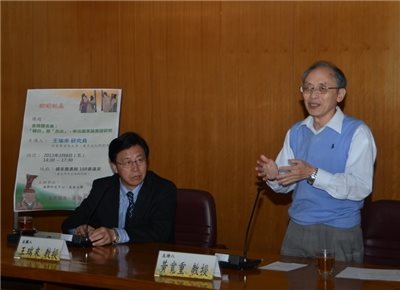News & Events
- 2013-03-11

The Center for Chinese Studies and Chang Gung University hosted “Roving through Art: Cultural Activities and Social Networks of Scholars in the 13th and 14th Centuries.” This series of lectures started on March 8 at the National Central Library with a speech by Professor Wang Rui-lai, a researcher at the Gakushuin University’s Japanese Cultural Graduate Institute. His topic was “After Passing the Civil Service Examination: ‘The First and the Last’--Evidence for Reforms in Song and Yuan.” Professor Huang Kuan-chung from Chang Gung University moderated the lecture. Before the event, Professor Wang donated two of his works, Imperial Power and Rule through Officials in the Song Dynasty and A Brief History of China, to the National Central Library. Professor Wang began by discussing Professor Naitō Konan’s “Tang-Song Reform Theory,” then laying out his own “Theory on Song-Yuan Reform” that addresses socio-politico-economic changes. Professor Wang zeroed in on changes to the civil service examinations during the Song as well as reforms in government bureaucracy, stating that institutional and personal factors almost effectively rendered Song scholars unable to break through the bottleneck into the medium and high ranks of officialdom. This cruel reality caused a rift between those who were disillusion with the official careers and that of mainstream politics. This led to a plethora of paths for scholars to take. Scholar dispersion, from an objective viewpoint, improved the intellectual strata of regional societies and strengthened regional social power. This change in the Southern Song is closely related to the fact that the civil service examinations were done away with for a long time during the Yuan dynasty. Furthermore, it has ties with the historical origins of country gentlemen power in the Ming and Qing dynasties. Caption: Professor Wang Rui-lai(left) and Professor Huang Kuan-chung(right)
- Resources
- NEWS & Events
- ABOUT NCL
- International Cooperation and Exchange
- Services






